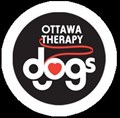Story
Ottawa Therapy Dogs strives to create a healthier community, one therapy dog visit at a time. Through our canine assisted interventions, volunteer handlers work with their own dogs to provide comfort and relief to individuals coping with physical and/or mental health challenges at healthcare, educational and social services facilities across the National Capital Region.
Some notable community partners where OTD provides regular visits include: The Ottawa Hospital, The Royal Mental Health Centre, the Children’s Hospital of Eastern Ontario, Roger Neilson Children’s Hospice, University of Ottawa, and the Queensway Carleton Hospital, among many others.
2025 marks the 25th anniversary of Ottawa Therapy Dogs—becoming a community partner this year is especially meaningful, as you can both celebrate OTD’s impact, and become a part of our legacy in fostering a healthier community.
In addition to regular therapy dog visits, Ottawa Therapy Dogs empowers elementary school students struggling with literacy through our Reading Education Assistance Dogs® (R.E.A.D.®) program. R.E.A.D.® teams work one-on-one with students weekly, throughout the school year, and this program has shown measurable results in improving reading and communication skills. Teachers report PM Benchmark reading levels increasing by 4 - 12 levels after a student reads with the dog over the course of a term! These astounding results are due to the fact that the comforting presence of a therapy dog helps create a supportive, non-judgmental environment that boosts confidence and promotes positive mental health benefits, which, in turn, improves learning outcomes.
Last year, Ottawa Therapy Dogs’ 34 volunteer teams collectively provided over 1,600 visits to our partner facilities! While this is certainly remarkable, imagine how many more visits we could provide to support vulnerable individuals if we could double the number of therapy dog teams!
Ottawa Therapy Dogs had the opportunity to share a glimpse into the impacts of our visits during an interview with CTV News in honour of Isaac’s 10th birthday. This heartfelt story features interviews with a family who has received ‘pawsitive’ support from Isaac, and Julie Jolicoeur, a volunteer handler with the organization: https://www.ctvnews.ca/ottawa/article/isaac-the-therapy-dog-turning-10-after-hundreds-of-visits-to-kids-at-cheo-and-ronald-mcdonald-house/
At this time, there are currently waitlist requests from over 70 facilities in Ottawa seeking volunteer visits. This includes elementary and high schools, long-term care facilities, hospices, retirement residences, and hospitals, among others. As our waitlist requests continue to outpace the capacity of our volunteer teams, support from our community is integral in providing the funding to bolster our recruitment efforts. Funds raised will be critical in expanding our reach in the community by supporting costs associated with the onboarding of new teams.
The incredible impact of our visits is beautifully conveyed through these testimonials. This is why every facility deserves to have a therapy dog visiting on a regular basis!
“Today, a young person who had been an inpatient for 3 months was being discharged. They had developed a special bond with our visiting Ottawa Therapy Dog. When the dog arrived for his visit, it had been arranged that they would get extra time to say good-bye to the dog. I will never forget the beautiful moment I witnessed when the young person placed their hands under the dog's chin, looked right into his eyes and said, “You are on my list of reasons to live, thank you”.
“Research has shown pet visitation can bring positive physiological changes to patients by reducing anxiety, decreasing pain and encouraging movement. We recently observed this first hand when the therapy dog was placed in bed beside a very ill child. His oxygen and cardiac values immediately stabilized and remained that way during the entire time the dog was with him. Non-verbal children have indicated their pleasure by smiling and laughing and reaching out to pat the dog. A previously withdrawn adolescent left his room to visit the dog and began to smile and interact with the staff.”
 Campaign by
Campaign by